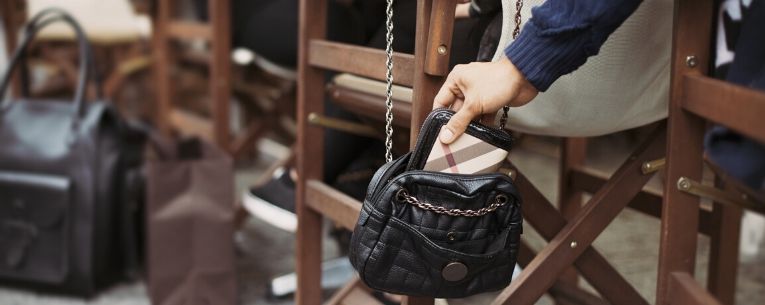It’s one thing to possess street smarts on the very street you live on. You know the people, what’s normal, and what’s sketchy.
But what about a random street in Minneapolis? Or Rome’s Via Nazionale?
Becoming the victim of travel fraud can deliver a buzzkill to even the most joyous, relaxing getaway. But by becoming familiar with some of the more popular scams and schemes hatched by grifters around the globe, you can have the confidence to walk the street without worrying — even if you can’t pronounce its name.
Before we run down travel warning signs and the proactive measures to take, consider a travel insurance plan from Allianz Partners. Their plans and experts help travelers out of all sorts of pinches, from having your bags stolen to your passport pick-pocketed. And if you get into a jam that causes a trip delay or even medical attention, you may find recourse in your plan’s benefits.
Here are some tips for avoiding some of the more popular travel fraud scenarios:
Steer Clear of Dastardly Drivers
Taxi drivers, ridesharing app chauffeurs, and pedicab pilots perform a critical task for travelers the world over: getting them from Point A to Point B. Unfortunately, it only takes a few bad bananas to spoil the bunch, and some of these professionals turn to travel fraud to make a few extra bucks.
Sometimes it’s blatant, taking you on a “scenic” 10-mile route when you’re just trying to get across town. Or claiming that the meter is broken and coming up with a rate — a highly inflated one — seemingly out of thin air.
Being a little more proactive can often prevent these dicey scenarios. For starters, always ask and visibly inspect meters and even credit card readers before committing to the ride. Or negotiate an agreed-upon rate for a trip to the airport or hotel. Also, don’t readily identify yourself as a stranger in a strange town; act like you’ve been there before and drivers are less likely to take you for a ride. Finally, flip on a mapping app to ensure you’re going the most direct way from here to there.1
Here’s another move that unscrupulous drivers love: making recommendations. Realize that by asking them to suggest a restaurant or tourist attraction, or just listening to their recommendation, you may very well end up where they’ve made a deal with the owner. That means money in their pocket, and quite possibly disappointment in your future. An extreme example of this “hospitality” involves telling you that a hotel or other destination is closed down, but they’re all too happy to take you to another. Don’t commit to the alternative until you’ve called or otherwise confirmed the breaking news.2
One last tip: before you get in a heated conversation with a driver regarding a rate, step outside the vehicle and collect all your bags. Otherwise, your next stop may just be suitcase shopping.1
Don’t Give Pick-Pockets Any Openings
You could smell the gyros as soon as you entered the market. And as you reach back to grab your wallet and pay for your tasty treat, you realize… it’s gone.
Pickpocketing is even more popular in Europe than tiny hotel rooms and bidets. In fact, the cities you’re most likely to have your wallet, purse, or tote swiped include Barcelona, Rome, and Prague.
So what’s one to do to protect their cash, cards, IDs, and all those loyalty cards that are just a single punch away from a free appetizer? We have a few ideas. First off, have a plan about what you carry. Don’t keep all your credit cards or cash in your wallet. Then there’s where you carry your valuables. Wallets should be kept in a front pocket — one trick is to keep a rubber band tightly around it to make it easier to sense when someone is reaching in. Purses should also be carried in front of you, preferably of the zipped variety, and clutched snugly.3 An even better idea is to leave the traditional wallet and purse at home, and instead strap on a money belt concealed under your pants, shirt, or skirt. You can wear it over your clothes as well.4
Next, you should be aware of pick-pocketing hot spots, such as crowded public transit cars, and know the tactics slippery-fingered criminals employ. The most blatant method is to smash up against you in a crowd and simply reach for your wallet. More experienced pickpockets will work in groups, where one member of the ring distracts you — spilling an item on you is a common ruse — and another makes the grab-and-go.3
If you’re carrying a bank card with an RFID chip, consider an RFID-blocking wallet, which blocks savvy crooks from using a card scanner to read and copy your card info via radio waves.5
Repeat After Me: “Nothing Is Free. Nothing Is Free. Nothing Is Free…”
You probably know the idiom, “There’s no such thing as a free lunch.”
Well, that applies to travel fraud, too. There’s no such thing as a free trip.
If you receive a call, email, or even a piece of snail mail advertising a “free trip,” be very wary. The truth is, unless you’ve won a legitimate raffle or contest that you entered of your own free will, it’s definitely bogus. If these offers come as a surprise to you, then hang up, hit “delete” or rip up the offer immediately. A clear giveaway that a free trip isn’t free — and will likely cost more than a trip you might willingly pay for — is when the contest sponsor starts asking for money, whether it be taxes or processing fees. Second-rate resorts, travel club memberships, and timeshares are often tied to such contests, so let that be another red flag. And if you’re still tempted to respond, vet them through the Better Business Bureau.6, 7
Travelers also need to be skeptical of travel fraud freebies on the road, too. For example, one popular scam involves a smiling stranger (think: kindly old woman) giving you something, whether they’re slipping a free friendship bracelet on your wrist or sharing a sprig of rosemary, yes, rosemary. These freebies are often shared in the spirit of good luck, and they most often greet female travelers, but they’re far from free. If you accept the “gift,” expect the gift-giver to then demand a hefty sum. And if you don’t pay up, expect them to make a scene, hooting and hollering while pressuring you to pay up.
Don’t worry, gents, there’s a scam that targets you as well. This usually comes in the form of female affection, when a flirtatious stranger approaches a male traveler, pressuring him to buy anything from drinks to artwork. If you guessed these are overpriced, you guessed correctly.2
Avoid Rental Damage Roulette
Whenever we rent a car, beach house, RV, or scooter there’s always a looming fear that we’ll dent, scratch, or somehow cause damage. We’ll be out a deposit and maybe even shunned to some imaginary blacklist where irresponsible renters are noted in perpetuity.
But what you actually need to fear is much worse: the company you’re renting from, or perhaps another party in cahoots with them, blaming you for damage you never caused. This travel fraud can take many forms. One version is that when you walk up to your rented moped, bike or sub-compact car in the morning, there’s a tiny scratch, dent, or rip. Maybe you don’t even notice it. But whoever’s waiting at the rental counter does notice it — and charges a hefty fee. Turns out they’re the ones who did it in a well-orchestrated grift, but who are you to prove otherwise?
Rental home scams, especially with the surging popularity of Airbnb, are on the rise these days. They go something like this: after you check out of your rented room or vacation home, you get a call or online message accusing you of trashing the unit, perhaps even damaging furniture, walls, and windows. One scheme even has owners alleging you didn’t leave / return your key — putting you on the line to pay for rekeying all the entrances. There goes your damage deposit — and perhaps much more. Efforts to refute the allegations can further be a vacuum of time and productivity.2, 8
The best defense against phony damage claims is two-fold. First, give more than a cursory look at who you’re renting from. Are there reviews? Do the reviews appear detailed and credible — or are they vague and riddled with typos? Then take pictures, lots of pictures. Take pictures when you receive the property, if you see something out of sorts, and again as you return the vehicle or exit the home.
Sniff Out Fishy WiFi
You’re at a bustling café sprawling onto the Marche Saint-Germain and you fire up your laptop to catch up on work emails and do a little banking. Bingo, you spy a WiFi signal that doesn’t require a password and connect.
Doh.
By plugging into a less-than-legit WiFi source, you’re immediately vulnerable to whoever is on the other end of that network. Your banking info, Social Security Number, and even your itinerary are easily discoverable by hackers. So, don’t just connect to any WiFi, ask the café or shop owner for the official network and password. (One tip-off that a connection is of a nefarious nature is when it asks you to answer many personal questions before granting access.) That alone isn’t enough to surf the Net with the confidence no one is peeking at you on the other side. Connect to a Virtual Private Network, or VPN, to ensure that your data stays encrypted.9
Falling victim to travel fraud can be a doubly negative experience. Not only are you out money — or even worse, personal or financial info that can cause months of stress — but your trip has been tarnished, too. Don’t let the bad guys get one over on you. Follow our proactive tips and advice, and walk the streets of a strange city without worrying about what or who lurks around every corner.
Related Articles








Share this Page